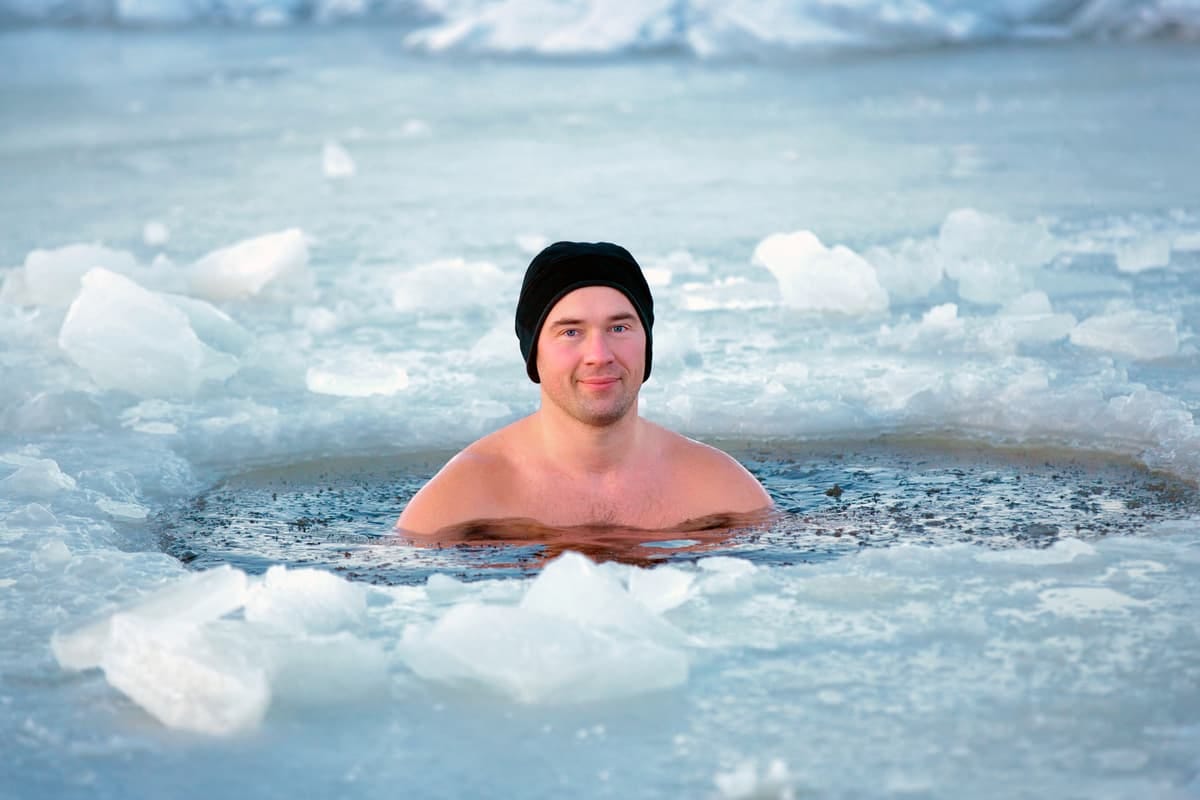Cold-water plunges and your health: The science is in
Researchers have examined the increasingly popular practice of cold-water immersion – things like taking a cold shower or sitting in an ice bath
Researchers have examined the increasingly popular practice of cold-water immersion – things like taking a cold shower or sitting in an ice bath – to see whether there’s any scientific basis for claiming that it has a positive effect on health and well-being.
Cryotherapy – applying ice, cold water, or cold air to the body to promote health – has been practiced for centuries. Indeed, the more-than 3,000-year-old Edwin Smith papyrus, the oldest known surviving scientific writings on spinal injuries, refers to treating spinal trauma with cold-water immersion.
The practice of cold-water immersion certainly has its devotees. But do daily cold plunges, whether it’s a cold shower, swimming in a frigid ocean, or sitting in a bathtub filled with ice cubes, really benefit health and well-being? To answer that question, researchers from the University of South Australia (UniSA) undertook the most comprehensive review and meta-analysis yet undertaken on the topic.
“Cold-water immersion has been extensively researched and used in sporting contexts to help athletes recover, but despite its growing popularity among health and well-being circles, little is known about its effects on the general population,” said Tara Cain, a research assistant from UniSA’s Alliance for Research in Exercise, Nutrition and Activity (ARENA) and the study’s lead and corresponding author.
The researchers reviewed and analyzed 11 studies published between 2014 and 2023, comprising a total of 3,177 healthy adult participants. Ten studies looked at immersion in an ice bath or cold plunge, and one studied the effect of cold showers. Studies were only included if participants were immersed in water at or above chest level. Water temperature ranged from 7 °C to 15 °C (45 °F to 59 °F), with immersion times of at least 30 seconds up to two hours. The outcomes of particular interest to the researchers related to sleep, stress, fatigue, energy, skin health, immunity, inflammation, mental well-being, depression, anxiety, mood, concentration, and alertness or focus.
“In this study, we noted a range of time-dependent results,” Cain said. “Firstly, we found that cold-water immersion could reduce stress levels, but for only about 12 hours post-exposure. We also noted that participants who took 30, 60, or 90-second cold showers [for 30 days] reported slightly higher quality of life scores. But again, after three months these effects had faded.
“Benefits may be gained from cold showers as well, with one study reporting that participants who took regular cold showers experiencing [sic] a 29% reduction in sickness absence. We also found some links to cold-water immersion and better sleep outcomes, but the data was restricted to males, so its broader application is limited. And while there have been claims that cold-water immersion experiences can boost your immunity and mood, we found very little evidence to support these claims.”
Somewhat counterintuitively, the researchers found that cold-water immersion was associated with a significant increase in inflammatory markers immediately and an hour after immersion.
“At first glance, this seems contradictory, as we know that ice baths are regularly used by elite athletes to reduce inflammation and muscle soreness after exercise,” said ARENA research fellow Dr Ben Singh, the senior author of the study. “The immediate spike in inflammation is the body’s reaction to the cold as a stressor. It helps the body adapt and recover and is similar to how exercise causes muscle damage before making muscles stronger, which is why athletes use it despite the short-term increase.
“Knowing this, people with pre-existing health conditions should take extra care if participating in cold-water immersion experiences as the initial inflammation could have detrimental health impacts.”
The studies reviewed as part of the present research were conducted in Australia, Lithuania, the Netherlands, Switzerland, Japan, the US, and Finland. Further randomized controlled trials using large, diverse samples of participants are needed to understand the long-term benefits and risks of cold-water immersion on health and well-being. Additionally, it would be interesting to investigate the dose-response aspects of the relationship between cryotherapy and health, including optimal temperature and the duration and frequency of exposure.
“Whether you are an elite athlete or everyday wellness seeker, it’s important to understand the effects of what you put your body through,” said Cain. “Right now, there isn’t enough high-quality research to say exactly who benefits most or what the ideal approach is to cold-water immersion.”
Go paid at the $5 a month level, and we will send you both the PDF and e-Pub versions of “Government” - The Biggest Scam in History… Exposed! and a coupon code for 10% off anything in the Government-Scam.com/Store.
Go paid at the $50 a year level, and we will send you a free paperback edition of Etienne’s book “Government” - The Biggest Scam in History… Exposed! OR a 64GB Liberator flash drive if you live in the US. If you are international, we will give you a $10 credit towards shipping if you agree to pay the remainder.
Support us at the $250 Founding Member Level and get a signed high-resolution hardcover of “Government” + Liberator flash drive + Larken Rose’s The Most Dangerous Superstition + Art of Liberty Foundation Stickers delivered anywhere in the world. Our only option for signed copies besides catching Etienne @ an event.








thyroid regulates heat in the human body
The thyroid gland plays a crucial role in regulating body temperature, functioning similarly to a thermostat. It achieves this through the secretion of thyroid hormones, primarily thyroxine (T4) and triiodothyronine (T3), which influence metabolic processes that generate heat.
## Mechanisms of Heat Regulation
- **Hormonal Signaling**: The thyroid hormones signal various systems in the body to enhance energy production, particularly from fat cells. Brown adipose tissue is vital for converting T4 into the more active T3, which is essential for producing ATP, the energy currency of cells, necessary for heat generation[1][4].
- **Vascular Effects**: Recent research indicates that thyroid hormones also affect blood vessel dilation, impacting how much heat escapes from the body. In individuals with hyperthyroidism, increased blood flow can lead to a sensation of feeling hot, while those with hypothyroidism may experience cold intolerance due to reduced blood flow and heat retention[2][3].
- **Thermogenesis**: Thyroid hormones stimulate thermogenic processes in tissues, particularly in brown fat. This process is essential for maintaining body temperature during cold exposure and involves complex interactions with the sympathetic nervous system[5][6].
## Clinical Implications
Patients with thyroid disorders often experience abnormal temperature sensitivities. For example:
- **Hyperthyroidism**: Individuals may feel excessively warm due to increased metabolic activity and heat production.
- **Hypothyroidism**: Affected individuals typically feel cold due to decreased metabolic rates and impaired thermogenesis[2][3].
Understanding these mechanisms not only helps explain temperature regulation in health but also informs potential treatments for those with thyroid dysfunctions.
Citations:
[1] Thyroid Function and Cold Intolerance | Paloma Health https://www.palomahealth.com/learn/thyroid-function-cold-intolerance
[2] Thyroid hormone plays a key part in the vascular regulation of body temperature https://news.ki.se/thyroid-hormone-plays-a-key-part-in-the-vascular-regulation-of-body-temperature
[3] How body temperature is affected by thyroid hormone https://www.medicalnewstoday.com/articles/266255
[4] Thyroid Hormones Regulate the Thermoregulatory Mechanisms of the Body: Review - PubMed https://pubmed.ncbi.nlm.nih.gov/38044694/
[5] Thyroid hormone control of thermogenesis and energy balance - PubMed https://pubmed.ncbi.nlm.nih.gov/8808101/
[6] The cross talk between thyroid hormones and the central nervous system in thermoregulation https://www.endocrine-abstracts.org/ea/0073/ea0073s11.2
[7] Frontiers | Temperature modulates systemic and central actions of thyroid hormones on BAT thermogenesis https://www.frontiersin.org/journals/physiology/articles/10.3389/fphys.2022.1017381/full
[8] Effects of thyroid hormones on thermogenesis and energy partitioning https://jme.bioscientifica.com/view/journals/jme/60/3/JME-17-0319.xml
I did this a lot back in the in my days in Quebec (sona followed by immersions in half frozen river)i ended up with a disfuncional thyroid, now I live in Mexico, to preserve what's left of my thyroid's function, without medication, ten years later,i have managed to keep my thyroid problems in check, thx to the constant warmth. Gracias México!